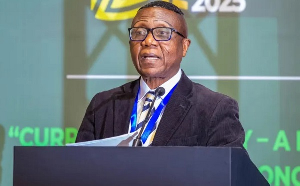.....in Ghana?Part l
“Ghana needs men of integrity, able, visionary and decent leaders urgently,” declared Chief Justice Georgina Theodora Wood. But here is the question: How many times have we heard calls for visionary leadership in Ghana in all their rhetorical variants? To be blunter, these rhetorical posturing and political tongue-lolling have even become a trite publicity stunt. The public ear, it appears, is gradually becoming less and less inured to these hackneyed public outcries.
How urgent do we need such Woodian leaders? In fact, since the calculated overthrow of Kwame Nkrumah, we have always yearned for this kind of quality leadership, leadership cast in the progressive political ideology of Nkrumah, a rare world leader from the African universe. Why have we not still got one? What role does Chief Justice Wood have for women in Ghanaian leadership politics? Since womanhood is a self-perpetuating vessel for humanity, could Chief Justice Wood ask our women why they have not given us such a leader in a long time? Given that political leadership cannot be raised as we raise poultry, what do we do?
Of course, the litany of financial scandals rocking the nation and which drew Chief Justice Wood’s righteous rhetorical ire are associated with political men, directionless men in leadership positions across the country. Then again, are politics and political scandalization the exclusive preserve of directionless political men? Indeed, we sympathize with her critical public stance against the apparent lack of political inaction and of moral leadership as far as excising the canker of political corruption from the body politic is concerned.
But masculinizing the problem gave an impression of a lack of social need for the moral leadership of women in the fight against corruption. Yet the prevalence of masculinizing corruption in the body politic clears the moral path for the equalizing exigencies of womanly influence to tread on in the political arena. In fact, there is statistical as well as anecdotal validity to this provocative assertion because men have always assumed political officership and, therefore, have, incidentally, had most political scandals, including corruption, associated with them.
As a result, we do a great disservice to ourselves, the nation, if we underestimate the political wisdom, spiritual foresight, and moral fortitude of our women. Shaggy captures this beautifully in his “Strength of a Woman.” Against this backdrop, we would have expected an emphasis in Chief Justice Wood’s public statement on the social role of our women in the corridors of power. On the other hand, she may have spoken directly to Ghana’s political lethargy from a woman’s perspective.
If this is even remotely the case, what does this mean for us in the immediacy of our contextual analysis? Among other stipulations, it may possibly mean that politically and socially active Ghanaian women, like their conscientious male counterparts, are closely watching their men captain the listing ship of national politics. Moreover, her bailiwick as a respected jurist even makes her public rhetoric even more pointedly interesting.
In any case, let’s give Chief Justice Wood the benefit of the doubt and just say that she used the exemplar of the male sex in a genderized plural sense, probably more in tune with the Bible-oriented procreative oratory “Let’s create man in our image.” Also, let’s just say that she used the exemplar in creative harmony with mainstream feminine politics, in which Bible-oriented gender exegetics re-contextualizes the existential spirituality and phenomenology of “man” to accommodate gender equality. It’s refreshing to see feminine politics de-emphasize intra-Biblical male chauvinism. We would have wished this methodology was extended to Koranic patriarchy.
However male chauvinists may want to look at, this methodological intra-textual reorientation, to some extent, has immense geopolitical and social ramifications for gender relations. Call it the militant brilliance of womanhood! Finally, the Diopian anthropological exploration of African Matriarchy shows how it undergirds gender equality in the strictest sense of the African social and cultural context. The Afrocentric perspective, we mean!
Listen: “So amazing how this world was made. I wonder if God is a woman. The gift of life astounds me till this day. I give it up for the woman…Such an angel when we need. God bless the ground beneath her feet…But if you look into her eyes. You’ll see the strength of a woman…So don’t you underestimate the strength of a woman,” Shaggy sings. As an aside, listen attentively to how the symphony of shrieking violins, crying guitars, feminized sultry backing vocalism, and syncopated drum beats in the background jibe with Shaggy’s angelic baritone.
How heavenly to have an aural feel of the choral words “strength of a woman” roll over Shaggy’s slippery tongue! Shaggy warns us not to underestimate the strength of a woman. In fact, we do so at our own national peril. In the meantime, Asante’s “Afrocentricty: The Theory of Social Change,” like Shaggy’s “Strength of a Woman,” challenges us, men, and enjoins us to honor the African woman. More essentially, the African woman holds immense corrective or balancing potential for the weaknesses of the African man.
In fact, the African woman, like womanhood, in general, is not only a wife, concubine, mother, grandmother, or girlfriend, but she’s also the domestic Rock of Gibraltar, the creative totality of a home, if you will, and more. The psycho-emotional and physical strength she respectively harbors in her mind as well as in her thighs, pundic and gastric muscles, hips, at the point of childbirth, alone, surpass the vaunted strength of manhood! Therefore, underestimating her strength guarantees the doom of manhood.
To wit, Ghana and Africa must exploit the creative potential of African womanhood for their respective developments. Presently, Ghana and Africa, together, have not expressed any potential interests in exploiting African womanhood, a wealth of untapped creativity, to the fullest, a mine, which, we believe, remains largely underexploited. Let’s remind ourselves that creative “natural resources” are not only found in the depths of African soil! The humane depths of the soul of African womanhood and the deeper recesses of her consciousness have it all.
No wonder Lucky Dube would dedicate a beautiful song to womanhood, calling it: “God Bless the Woman.” Rapper Tupac called his “Dear Mama,” Sizzla “Thank You Mama,” and Prince Nico Mbarga “Sweet Mother.” The only probable deviation was the late Luther Vandross, a three-octave baritone, who, indeed, clamored for “A Dance With My Father.” However, that is not a problem since we can ask Maria Carey, a diva noted for her five-octave range, to do a feminized cover of Luther’s “A Dance With My Father.” We may call Carey’s “A Dance With My Mother.”
Having said all that, what is the problem with the human male? Are the major problems, historical and contemporary, mostly occasioned by the human male part of the reasons genetics professors Brian Skykes and Jennifer Graves both predicted the extinction of the Y chromosome (carried by men) and of men, with the former stating 100,000, as opposed to the latter’s 5 million, years as the timeline for the actualization of man’s chromosomal extinction (See Skypes’ “Adam’s Curse: A Future Without Men)?
Therefore, it came as a great relief when this “male Y chromosome extinction” theory came under fierce attack. As of this writing, a recent study undertaken by American scientists and documented in “Nature” seems to have put the controversial theory to eternal rest. But the hard facts still remain nonetheless: What is it in the male, unlike the female, gene which predisposes man to hiccoughs of brutality, martialism, stubbornness, and confrontational posturing?
Why are scandalous corruption cases rocking the nation on sustained basis and yet no end seems to be in sight as regards their finite resolution? Could we hold our incumbent president solely responsible for the seemingly never-ending spate of corruption scandals? Isn’t the mandate of President John Mahama a true reflection of the people’s universal franchise? If that is the case, aren’t the people partly to blame for presidential incompetence, moral lapses, and political inaction?
It’s sad to see our politics, the so-called “winner-takes-all” political malaise, assuming the emotional politics of Orwellian “Animal Farm.” How Chief Justice Wood thinks about the role Ghana’s judiciary has to play in the national fight against corruption can only be guessed from a comfortable distance. Yet the judiciary itself is as shamelessly corrupt as our presidential and parliamentary politics. In fact, one plays the devil’s advocate for the other.
Ask the jurist and the politician which of them ate the financial apple in Ghana’s political Garden of Eden, and either will give you the run around: The serpent made me eat it. The woman made me eat it. The serpent ordered us to eat it. And the serpent God, the President who is in on all the shady deals, idly occupies the nonchalant seat of Julius Cesar! Namely, the Ghanaian Julius Cesar does practically nothing. Moreover, like a well-fed anaconda, the serpentine presidency goes on a long journey of social hibernation, ignoring public clamor for redress and social justice.
Comically, the model-like gait of corruption assumes a national catwalk in the midst of crushing national problems: Children go to school under trees. Our hospitals lack medications. Workers go for months without salaries. We lack quality road networks. Our schools lack computers, furniture, dispensaries, and stationery. Children go to bed at night underfed, undernourished, and malnourished. Graduate unemployment skyrockets annually. We lack cutting-edge maternal health and pediatric facilities. Politicians seek medical attention at as well as send their children to be educated abroad on fat national checks.
Also, clueless politicians enjoy fat salaries in their parliamentary harems and psychiatric hospital beds, while brilliant and hardworking teachers, nurses, doctors, on the other hand, are asked to be sacrificial lambs, a command Abraham hesitantly obeyed. A politician who always enjoys the comfort of free air-conditioned facilities asks his fellow Ghanaians working in sweltering and deplorable conditions to get their passports and leave the country to seek air-conditioned environments abroad.
And when the hungry masses confront the corrupt politician about his fortuitous wealth and sartorial flashiness, he tells them dismissively that he’s a self-made millionaire. How can the corrupt politician be a self-made millionaire when he does not live in relative isolation, that’s, in a social, economic, and political island from them? Since when did individuals achieve success without patronizing inputs from the masses?
Who are Christ, Whitney Houston, Cheikh Anta Diop, Mariah Carey, Prophet Muhammad, Aretha Franklin, Michael Jackson, Usain Bolt, Phillis Wheatley, Buddha, Albert Einstein, Nina Simone, Pele, Mandela, Mohammed Ali, Miriam Makeba, Elvis Presley, Celine Dion, and Marcus Garvey without the masses?
We shall return with Part ll…
Opinions of Tuesday, 5 November 2013
Columnist: Kwarteng, Francis














